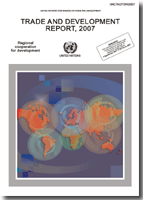
The Trade and Development Report 2007, subtitled "Regional cooperation for development", recommends that developing countries should strengthen regional cooperation with other developing countries, but proceed carefully with regard to North-South bilateral or regional preferential trade agreements. Such agreements may offer gains in terms of market access and higher foreign direct investment, but they can also limit national policy space, which can play an important role in the medium- and long-term growth of competitive industries. By contrast, strengthened regional cooperation among developing countries can help accelerate industrialization and structural change and ease integration into the global economy. However, to achieve this, trade liberalization is not enough; active regional cooperation should also extend to areas of policy that strengthen the potential for growth and structural change, including monetary and financial arrangements, large infrastructure and knowledge- generation projects, and industrial policies.
In its analysis of global economic prospects, the Report says the current global economic environment provides great opportunities for catch-up growth and meeting the Millennium Development Goals. However, the world economy is overshadowed by serious current-account imbalances, and by large speculative capital flows that distort exchange rates and perpetuate these imbalances. A safe correction of the imbalances would be much easier with more appropriate global exchange-rate arrangements, the Report argues. Exchange rates should be subject to the same kind of disciplines as tariffs and export subsidies. In the absence of such disciplines, however, regional monetary and financial cooperation among developing countries can fill some of the gaps in global economic governance.



